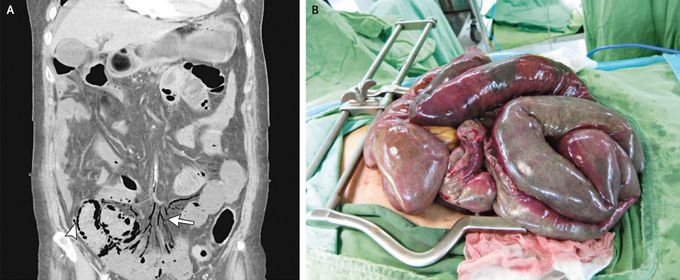


Case Report
A 75-year-old woman with chronic atrial fibrillation presented to the hospital with a 2-day history of colicky abdominal pain. The physical examination revealed hypoactive bowel sounds and diffuse abdominal tenderness. Laboratory tests showed a white-cell count of 19,400 per cubic millimeter with 92% neutrophils, a blood urea nitrogen level of 42 mg per deciliter (15 mmol per liter), and a serum creatinine level of 3.0 mg per deciliter (267 μmol per liter). Abdominal computed tomography with contrast material showed occlusion of the main trunk of the superior mesenteric artery with mesenteric venous gas (Panel A, reconstructed coronal image, arrow) and pneumatosis intestinalis (arrowhead). Laparotomy revealed ischemic changes with congestion and transluminal necrosis of the small bowel (Panel B) and ascending colon. The superior mesenteric artery is susceptible to embolic occlusion because of its large caliber and narrow take-off angle from the aorta. Although surgical resection of the necrotic bowel is the treatment of choice, the patient and her family opted for conservative treatment. The patient died 3 days later.
Family education is most important We should completely tell the family that situation and that she is deteriorating and there is faulty or poisonous segment of in her abdomen must be resected otherwise she will die and you will be responsible for her death I think if the family heard that they will probably change their mind
I know but we try our best for the sake of patient and his life If you talk to the patient family in a most simple and a reasonable way with confidence of your decision And try to get to their level of thinking and be most reasonable i would told you that their choice would be different No culture or religious want a patient dead i believe Most families that you talk about are afraid to take the decision due to low confidence in doctors That where you should explain to them and make it simple to them as you can And if they refuse you can say that you did your best for the patient
A lot of patients have died just like this, because of their families choices even though that the available treatment won't save the patient's life but it could help to live a few more days or months.
Human pulp capped with calcium hydroxide cementPhineas Gage: A Case Study in Brain Injury and Personality Change
A 70-year-old man presents with difficulty walking, particularly when turning, and a sensation of his feet being "stuck" to the floor. His gait is characterized by hesitation and freezing when initiating steps. Which of the following is most likely to be observed in this patient? A. Spasticity B. Foot drop C.Freezing of gait D. Romberg signBest Probiotics For Womens 2025: Are They More Effective?Effects of sugar on teeth


